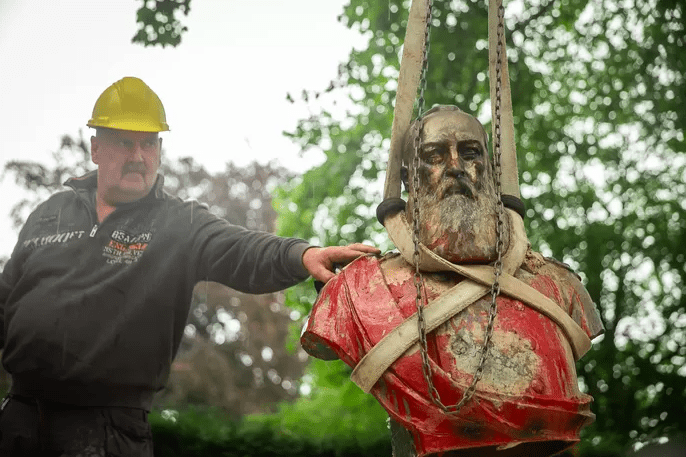The Flemish government has created a manual to guide local authorities on how to deal with public monuments and commemorations of Belgium's colonial past.
The manual will be delivered on Friday to all Flemish municipalities and will aim to equip them with necessary “context” to address the highly polarising debate on whether to keep, remove or adapt public monuments celebrating the country's colonial exploits, which gained traction amid global anti-racism and decolonisation protests this summer.
“The manual provides context, arguments and provides options for possible solutions,” Somers said.
Related News
- Flemish city to take down royal portraits in protest of 'colonial atrocities'
- Leopold II statue defaced again in Africa Museum
- Ixelles will remove bust of Leopold II's 'ruthless' colonial general
The guide was commissioned to the Agency for Civic Integration by minister Bart Somers and drafted by an expert group including academics, such as Belgo-Congolese historian Mathieu Zana Etambala, a researcher at KU Leuven and Flemish political philosopher Patrick Loobuyck from the University of Antwerp, who specialises in subjects like secularism.
Somers said the objective of the guide was not to give a one-size-fits-all approach but to encourage a dialogue within communities which could pave the way on what to do with statues, monuments or street names commemorating the country’s colonial legacy.
“Sometimes it will be decided to remove an image, to move it into a museum,” Somers said. “Other times it can be decided to work with ‘counter images,’ or to add context plaques and accompanying texts.”
“As the document itself summarises: no one is advocating for iconoclasm,” he added.
The release of the guide follows months of heated debate in Belgium over the presence of colonial statues and monuments in public space, several of which were defaced in recent months.
Some cities or universities ultimately decided to pull down statues of the country’s colonial monarch, Leopold II, who exploited and brutalised Congolese people during his time as sole ruler of the Congo.
The debate surrounding colonial monuments in Belgium was rekindled amid worldwide protests against police brutality and systemic racism sparked by the police killing of Black American George Floyd in May, which saw tens of thousands take part in protests across the world, with one protest in Brussels drawing some 10,000 demonstrators.
Announcing the removal of a Leopold II bust from a university library hall, KU Leuven Rector Dean Sels said that, although historically important to Belgium, the former monarch was "not the kind of personality" that the university wanted to honour.
Gabriela Galindo
The Brussels Times

